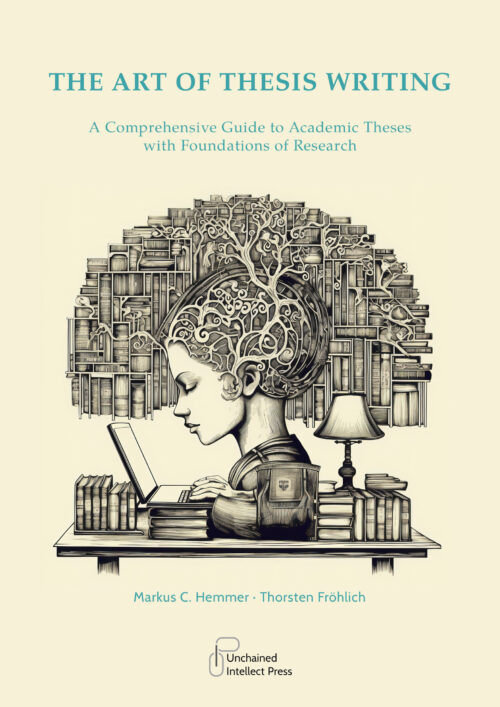1. Content Coverage & Structure
The book is exceptionally comprehensive, covering every stage of thesis writing from conceptualization to defense. It is structured into five distinct parts:
- The Science Primer: Covers philosophical and epistemological foundations of research.
- The Composer’s Guide: Focuses on organization, writing tools, and AI-assisted writing.
- The Creator’s Guide: Helps students select topics, refine research questions, and structure their proposals.
- The Writer’s Guide: Provides detailed guidance for each chapter of a thesis, including research design, literature reviews, and discussion.
- The Presenter’s Guide: Prepares students for thesis presentations and defenses.
The structured approach makes it easier for students to navigate based on their stage in the thesis-writing process.
✅ Strengths: Covers all essential aspects, integrates philosophy with research methodology, and includes AI-based writing tools.
🔴 Potential Weakness: The depth of epistemological and methodological discussions may be overwhelming for undergraduate students.
2. Academic Rigor & Accuracy
The book demonstrates a strong academic foundation, incorporating philosophical perspectives, reasoning frameworks, and methodological rigor. It does not merely provide “tips” but justifies its recommendations with logical argumentation and references to scientific literature.
✅ Strengths:
- Well-grounded in research methodology and epistemology.
- Critical assessment of different paradigms, avoiding blind adherence to mainstream views.
- Clearly distinguishes between different research approaches and their implications.
🔴 Potential Weakness:
- Some discussions on philosophy of science may be too theoretical for students who need practical guidance without deep philosophical discourse.
3. Pedagogical Effectiveness
The book includes multiple learning aids:
- Checklists: Help students ensure they meet key requirements.
- “Worst Practices” sections: Highlight common mistakes and how to avoid them.
- Practical examples: Demonstrate how concepts apply in real thesis writing.
- Step-by-step guides: Particularly useful for structuring chapters like literature reviews, research design, and conclusions.
✅ Strengths: Interactive, student-friendly format with humor and real-life applications.
🔴 Potential Weakness: Advanced concepts may require additional explanation or support materials for beginners.
4. Innovative & Unique Features
A major distinguishing feature is its inclusion of AI tools like ChatGPT, discussing their potential for assisting with thesis writing while warning of possible drawbacks.
Additionally, the book challenges outdated paradigms and offers a critical perspective on traditional research methodologies.
✅ Strengths:
- Addresses AI tools in academic writing, a highly relevant topic.
- Engages in critical discourse rather than simply following conventional guidelines.
🔴 Potential Weakness:
- While AI discussion is a unique strength, future editions may need regular updates as AI technology evolves.
5. Clarity & Readability
The writing style is clear, engaging, and sometimes humorous, making complex topics more digestible. The authors avoid excessive jargon and use analogies to simplify difficult concepts.
✅ Strengths:
- Readable and engaging style with occasional humor.
- Balances theoretical and practical insights well.
🔴 Potential Weakness:
- Certain sections (e.g., philosophical discussions) may require simplification for non-specialists.
6. Usefulness for Different Audiences
The book is intended for students at all levels but is particularly beneficial for Master’s and PhD students. Supervisors and educators can also use it to guide students more effectively.
✅ Strengths:
- Not limited to a specific discipline, making it broadly applicable.
- Can be useful for both students and educators.
🔴 Potential Weakness:
- Undergraduate students may require additional support to digest advanced concepts.
Final Assessment:
Overall Rating: ★★★★★ (5/5)
Ideal for:
✔ Master’s and PhD students working on research-heavy theses.
✔ Educators and supervisors who want to improve thesis guidance.
✔ Students interested in AI tools for academic writing.
Not ideal for:
❌ Absolute beginners who need a very basic, step-by-step writing guide.
❌ Students looking for only a simplified “how-to” rather than a deep academic discussion.
This book stands out due to its rigorous academic foundation, pedagogical effectiveness, and incorporation of AI-assisted writing tools. While some sections may be dense for undergraduate students, it is an invaluable resource for advanced research writing.
Authors: Markus C. Hemmer, Thorsten Fröhlich
Publisher: Unchained Intellect Press
Year: 2023
ISBN: 978-3-9825742-0-2





